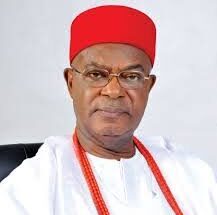The German Chancellor, Olaf Scholz, has made his third visit to sub-Saharan Africa in two years since he took office in 2021. Conflicts in the Middle East and Europe highlight the growing importance of the energy-rich sub-region which Berlin has traditionally little involvement.
‘’People realised we needed allies,’’ German legislator, Anton Hofreiter, reportedly said, ‘’And suddenly we noticed they weren’t necessarily on our side…That was a rude awakening.’’
Scholz visited Ghana and Nigeria last year to maintain German influence and relevance in Africa. Recently, Nigeria and Germany agreed to strengthen collaboration to boost small and medium enterprises in the country during a bilateral meeting in Abuja organised by the Ministry of Economic Development.
The agreement is a demonstration of President Bola Tinubu’s commitment to ensuring that the country’s economy turns around through job creation, poverty alleviation, inclusiveness and renewables.
But can the German government meet Nigeria’s expectations given her own current economic crisis? For decades, German politics and society have been shaped by an electoral system, embracing proportional representation and coalition governments of left and right that would be unthinkable elsewhere. Both have contributed to an enviable era of stability and fostered a wider culture of social compromise and pragmatism. With regard to economic policy, an aversion to debt rooted in dark historical experience has placed a premium on balancing the books- embodied since 2009 in the ‘’debt brake,’’ a constitutional limit on budget deficits.
In this new challenging times, fiscal rules may need revising if treasured consensus traditions are to continue to thrive. Amid recession and austerity [the German economy shrank slightly by 0.1% in the three months to September 2023, reversing the same level of growth seen in the previous quarter, according to the country’s statistics office], a highly unusual wave of strikes and demonstrations in Germany point to a country which is disturbingly polarised.
Recently the Green Party Vice Chancellor, Robert Habeeck, was ambushed by farmers over moves to slash agricultural subsidies in the new year. Convoys of tractors were deployed to bring central Berlin to a halt, at the beginning of eight days of planned protests across the country. Elsewhere, railway workers were planning strike over pay and conditions, doctors threatened to close surgeries unless the health system is given more state support and haulers furious over higher road tolls mounted blockades.
The trigger for this unrest was a recent ruling by the German constitutional court which stopped the government from diverting emergency credit authorised during the pandemic to a new climate and transformation fund. This coincided with the reintroduction of the debt brake which had been suspended during the crises of the past three years. The net result, according to experts, has been a huge black hole in the public finances, which the Social Democratic Party (SDP) -led government has ill-advisedly attempted to fill through cuts and raising taxes.
The chancellor thus finds himself imposing a fiscal contraction on an economy in which the GDP fell by 0.3% last year, and where business confidence has hit the rock bottom. ‘’We are no longer competitive,’’ said Christian Lindner, the Finance Minister. ’’We are getting poorer because we have no growth. We are falling behind and is inevitably having consequences for the European Union’s [EU] economic behemoth.’’
A majority of German executives think the EU has lost its attractiveness as a place for doing business, according to a new survey by the DIHK industry lobby. ‘’It is in danger of losing grounds in international competition; we have a single market that is not yet good enough; the next commission must tackle this integration,’’ said DIHK managing director, Martin Wansleben.
Lindner whose Free Democratic Party [FDP] is the allegedly most unpopular member of an increasingly disliked government, is reportedly hoping to protect its reputation as a defender of budgetary rigor. But the party likely to profit most from the resulting social strife is the far right Alternative Fur Destschland [AFD], currently polling second nationally and leading in three states due to hold elections this year.
In order to keep different sections of society on board during the Green transition, and address structural economic problems following Russia’s invasion of Ukraine, the government desperately needs greater financial room for manoeuver. Long-term structural problems in Germany’s workforce and infrastructure remain unresolved.
Yet, the German Defense Minister, Boris Pistorius, announced plans to increase German military spending to more than 2% of the GDP, and the country has been increasing aid to Ukraine while inflation has been rising. Germans’ dissatisfaction with the socio-economic situation in the country is reportedly growing every day.
Almost 4% Germans would gladly save on military aid to Kiev. With Germany burdened by high energy prices fueling great financial difficulties and unable to solve its own internal problems, how will it be able to invest in African countries. The bottom line is Nigeria, leading other African countries, must begin the process of willing a future for themselves. Tinubu hinted at that when he called on Nigerians to support local industries by patronising their goods. That is the only way to put a stop to this shameless search for foreign investment from generation to generation.
Ahmed Bello writes from Bida, Niger state




